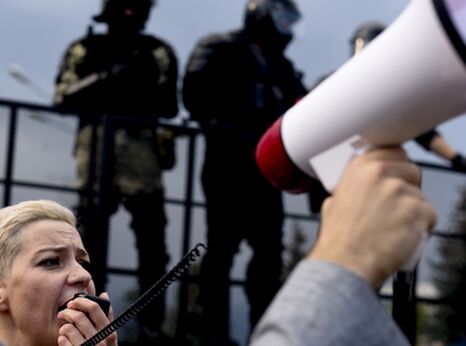Free opposition leader Maryia Kalesnikava

Photo Copyright Credit: Anadolu Agency via Getty Images
Maryia Kalesnikava, a professional musician and former artistic director of a cultural centre, joined the campaign of presidential candidate Viktar Babaryka in May. She became one of the leaders of the opposition after Viktar Babaryka and another presidential hopeful, Siarhei Tsikhanousky, were arrested in the run-up to the presidential election on 9 August. Together with Svyatlana Tsikhanouskaya and Veranika Tsapkala, Maryia Kalesnikava formed an all-female trio who led an electoral challenge to, and galvanized mass protest vote against, the incumbent Alyaksandr Lukashenka. Veranika Tsapkala left Belarus on 9 August for fear of persecution. Following Svyatlana Tsikhanouskaya’s forced exile on 10 August, Maryia Kalesnikava emerged as the highest-profile opposition figure in Belarus. She appeared on the frontline of numerous peaceful street protests, repeatedly confronted abusive police officers, gave numerous media interviews and continued to support individuals who had suffered arbitrary arrest and torture and other ill-treatment in detention. Maryia Kalesnikava is one of the seven-member Presidium of the opposition Coordinating Council formed after the election.
Maryia Kalesnikava went missing on the morning of 7 September, at the same time as two other prominent Coordinating Council members, Ivan Krautsou and Anton Radnyankou. Eyewitnesses saw her being dragged into a van marked “Communications” by masked men in plainclothes. Throughout that day, the authorities denied any knowledge of their fate and whereabouts. In the morning of 8 September, Ukrainian authorities officially confirmed that Ivan Krautsou and Anton Radnyankou had crossed into the country. It later transpired in the media, that the two had been forced to leave Belarus against their will. It also transpired that Maryia Kalesnikava was with them but resisted and managed to avoid expulsion into Ukraine by tearing up her passport. Despite the Belarusian authorities’ denials, it was widely believed that she was taken in custody. Her whereabouts were only disclosed by Belarusian authorities on 9 September, more than 48 hours after her disappearance. After being held by the border guards in Mazyr, she was transferred to a detention centre in the capital Minsk, and later to a detention centre in Zhodzina, away from the capital where crowds were regularly gathering at the gate demanding her release. She remains in detention as a criminal suspect facing charges under Article 361 of the Criminal Code (“Calls to actions seeking to undermine national security”). If convicted, she faces up to five years’ imprisonment.
Maryia Kalesnikava is not the only one prosecuted in connection with the election. Even before the election day, dozens of critics of Alyaksandr Lukashenka were arrested under trumped-up charges including Siarhei Tsikhanousky, Viktar Babaryka, Paval Sieviaryniec, and Vitali Shklyarau. When peaceful demonstrations against Lukashenka’s officially proclaimed victory started on 9 August, authorities cracked down on the protesters. Riot police shot rubber bullets, threw stun grenades, used water cannons and chemical irritants to disperse peaceful crowds. Some 7,000 protesters were arrested, and many of them were beaten, humiliated and tortured and otherwise ill-treated in overcrowded detention centres during the first week of protests. Thousands of peaceful protesters have been subjected to similar treatment since. Leaders of the protest were arrested or forced into exile.